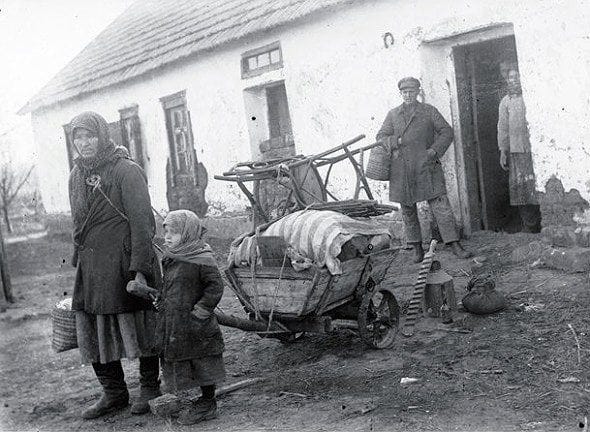"If you have one cow, and your neighbor has two..........."
"............then he is a kulak." On elastic definitions that serve a purpose.
Kulak family going into exile.
“If you have one cow and your neighbor has two, he is a kulak.” This was classic Russian humor in the Soviet era, the answer to “what is a kulak?” Originally, a kulak was a relatively well-to-do peasant farmer, a little better off than his neighbors, who may have hired seasonal help, or maybe loaned money. They were usually the best and most productive farmers in the area. Once farm collectivization got rolling, a kulak became anyone who resisted it, regardless of their poverty, which was pretty much any farmer in Ukraine or Kazakhstan. Eventually it just meant a party member likes your house. Hundreds of thousands of kulak families were executed, deported, or imprisoned. Millions were starved and eventually collectivized. It became a universal slur for a rural opponent of the state.
The Soviet kulak was the peasant equivalent of the petit bourgeois, those mini-capitalists who owned shops or small businesses in urban areas, and could be assumed to oppose socialism because they thought they could become better off through their own hard work and good business sense. They were more guilty of reactionary aspirations than actual wealth accumulation, but the resentful revolutionaries hated, just hated, them, seemingly more than they hated the actual capitalists. But, you know, they did employ people and have a little money to invest in their farms and businesses, therefore....... So they enslaved and killed them. Problem solved.
The highest embodiment of the agrarian vision was not the eastern European kulak, but the American yeoman farmer, Thomas Jefferson’s democratic ideal. J.R.R. Tolkien’s Hobbit was pretty close, too, but without the political connotations and they were, well, fictional, though they did sing cute little songs. Because these yeomen owned their own land, employed little or no hired labor, didn’t keep slaves, were educated and literate, and sold to a free market, they were independent of bosses, politicians, landlords, and bankers. These free and independent agents could act in their best interests and that of their community and country, and do so in a well-informed manner. Jefferson thought only with a majority of the population so empowered could a democracy prosper.
But it turns out Jefferson was wrong. It didn’t take a majority as farmers. It took a widespread belief in being free and independent thinkers who valued self-government, the American ideals best represented by the yeoman farmer.
The reality, it should be noted, didn’t measure up to this ideal. It never does. Slaves, sharecroppers, and Indians had no such luck, and it took almost 200 years after the founding for them to achieve full legal equality. But it worked out well enough to produce, on the whole, the freest, most democratic, most prosperous, and best educated society in history, as well as the best engine for the advancement of former slaves and people of African descent the world has ever seen, at least partly as result of the yeoman farmer vision. When you compare it to socialist utopia, as we so often do, the gritty disappointment of the America of the yeoman farmer, such as it is, falls short. But at least it exists, unlike socialist utopia.
Both the mythic image of the yeoman and the sad fate of the kulak illuminate hard truths. The former shows us a model for how to ensure individual rights to create a strong, democratic and decentralized society. The latter shows what will happen if the opponents of individual rights and broad participation in government, the Marxists and collectivists, have their way.
The domestic attack on our liberal democracy has never been stronger, or come from higher places. Our cause is not lost, and we can still guarantee a free America, but it is absolutely threatened. Many of the attributes of the yeoman farmer can keep our country and your family from the fate of the kulaks, and you don’t have to be a farmer. As Benjamin Franklin, when asked what kind of government we had come up with, replied, “a republic, if you can keep it.”





